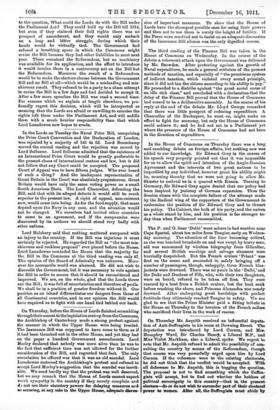On Thursday, before the House of Lords finished scrambling through
their assent to the legislation sent up from the Commons, the Archbishop of Canterbury made a strong protest against the manner in which the Upper House were being treated. The Insurance Bill was supposed to have come to them as if it had been thrashed out in the other House, and yet they had on the paper a hundred Government amendments. Lord Morley declared that nobody was more alive than he was to the fact that sufficient time was not allowed for the further consideration of the Bill, and regretted that fact. The only consolation he offered was that it was an old scandal. Lord Lansdowne endorsed the Archbishop's protest and refused to accept Lord Morley's suggestion that the scandal was inevit- able. We need hardly say that the protest was well deserved, but we may remark that the House of Lords cannot expect much sympathy in the country if they merely complain and d 3 not use their statutory powers for delaying measures and so securing, at any rate in the Upper House, adequate discus-
sion of important measures. To show that the House of Lords have the strongest possible ease for using their powers and then not to use them is surely the height of futility. If the Peers were resolved not to insist on an adequate discussion of the Insurance Bill silence was the only dignified course.


















































 Previous page
Previous page